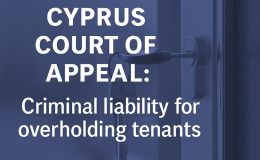New Cyprus Trapped Buyers Law 2025: Secure Your Title Deeds with Expert Legal Help
In a significant development for Cyprus’s property market, a new law passed by the Cyprus Parliament in June 2025 aims to resolve the long-standing issue of “trapped buyers”—approximately 9,500 individuals who have paid for their properties in full but have been unable to obtain title deeds due to developer debts, mortgages, or other encumbrances. This legislation addresses a decades-long problem that has left both Cypriot and foreign buyers in legal and financial limbo, unable to fully exercise their property rights.
The issue of trapped buyers in Cyprus stems from a systemic problem in the property market, particularly prevalent during the property boom of the early 2000s. Many buyers, including a significant number of foreign nationals purchasing holiday or retirement homes, paid developers in full for properties—often off-plan—only to discover that the properties were encumbered by mortgages, unpaid taxes, or planning violations. These encumbrances, typically resulting from developers’ financial mismanagement, prevented the transfer of title deeds, leaving buyers without legal ownership despite fulfilling their contractual obligations.
In 2015, the Cyprus Parliament enacted Law 139(I)/2015, known as the “Trapped Buyers Law,” to address this issue. The law allowed buyers who had lodged their sale contracts with the Land Registry by December 31, 2014, to apply for title deed transfers, bypassing developers and overriding mortgages or other encumbrances under certain conditions. This legislation facilitated the issuance of title deeds for many buyers, with 11,462 titles issued out of 21,461 applications submitted since 2015. However, 9,497 applications remained unresolved, largely due to complex cases involving pre-existing mortgages or planning violations.
A significant setback occurred on June 20, 2024, when the Cyprus Court of Appeal ruled that certain provisions of the 2015 Trapped Buyers Law were unconstitutional. The court held that allowing title transfers without the consent of creditors, such as banks holding mortgages on the properties, infringed upon creditors’ constitutional property rights. This ruling led to a moratorium on processing trapped buyers’ applications by the Department of Lands and Surveys (DLS), leaving thousands of buyers in renewed uncertainty. The 2024 Supreme Court decision further complicated the situation, prompting the government to develop new legislation to balance the rights of buyers and creditors.
The new law, enacted in 2025, amends the Immovable Property (Transfer and Mortgage) Law (Cap. 224) to restore protections for trapped buyers while addressing the constitutional concerns raised by the 2024 Court of Appeal ruling. The legislation, developed by the Parliamentary Legal Affairs Committee in collaboration with the Ministry of Interior, the Legal Service, and stakeholders such as the Cyprus Bar Association and the Bankers’ Association, introduces several key provisions to facilitate title deed transfers:
- Eligibility Criteria: The law applies to buyers who signed and filed sale contracts with the Land Registry by December 31, 2014, or filed contracts with District Courts by December 31, 2024. It covers approximately 9,497 trapped buyers whose applications were frozen following the 2024 Supreme Court ruling.
- Court Intervention for Unreasonable Refusals: If a lender or creditor unfairly withholds consent to release a mortgage or encumbrance, buyers can apply to a court for an order to override the refusal. Buyers must file their court application within a 45-day window after a lender’s refusal. During this period, all other legal or administrative actions involving the property are paused to prevent conflicting proceedings.
- Encumbrance Removal: Upon obtaining written consent from the lender or a court order, the DLS can remove encumbrances such as mortgages, enabling the property to be registered in the buyer’s name. In cases where a mortgage was applied before the sale contract was lodged (approximately 4,080 complex cases), lender consent or a court ruling is mandatory.
- Time Limits and Rejections: For pending applications, buyers must submit supporting documents within eight months. If no title deed is issued within 32 months, or if issuing a title is deemed impossible for legal reasons (e.g., significant planning violations), the DLS Director may reject the application.
- Planning Violations: In cases where title deeds cannot be issued due to planning irregularities, the DLS may issue the title deed to the original owner (typically the developer) if the violations are covered by the latest urban planning amnesty. This provision aims to resolve some of the 4,080 cases delayed by planning issues.
The 2025 law represents a significant step forward in addressing the trapped buyers crisis, offering a clear legal pathway for thousands of buyers to secure their title deeds. Key implications include restored hope for ownership, as the law provides relief for approximately 2,500 buyers whose properties were burdened after their sale contracts were lodged, and it offers a mechanism for the remaining 5,417 cases pending clarification on separate title deeds. The court intervention option ensures that buyers are not indefinitely stalled by uncooperative lenders. Additionally, the law provides legal clarity by aligning with constitutional principles, balancing the rights of buyers and creditors, and reducing the risk of future legal challenges. It is also expected to restore confidence in the Cyprus property market, which has been negatively impacted by the uncertainty surrounding title deeds. Prospective buyers may feel more secure knowing that legal protections exist for obtaining clear ownership.
However, the law is not a comprehensive solution. Approximately 4,080 cases involving pre-existing mortgages remain complex, requiring lender consent or court intervention. Additionally, the law does not address the thousands of buyers trapped by serious planning violations, such as properties built without proper permits or infrastructure (e.g., missing roads). These buyers continue to face significant obstacles. Other challenges include the procedural burdens of strict deadlines, such as the 45-day window for court applications and the eight-month deadline for submitting supporting documents, which may pose difficulties for buyers, particularly those unfamiliar with Cyprus’s legal system or residing abroad. The law also primarily addresses buyers with contracts filed by December 31, 2014, or District Court filings by December 31, 2024, leaving later buyers or those with non-mortgage-related issues without relief.
For trapped buyers seeking to benefit from the new law, the following steps are recommended:
- Verify Eligibility: Confirm that your sale contract was lodged with the Land Registry by December 31, 2014, or filed with a District Court by December 31, 2024. If the contract was not lodged, consult a lawyer to apply for a court order permitting its deposit.
- Conduct Due Diligence: Obtain a search certificate from the DLS to identify any mortgages, encumbrances, or planning violations affecting the property. This is critical before initiating any title transfer process.
- Engage Legal Representation: Work with an experienced Cyprus property lawyer to navigate the application process, court proceedings, and lender negotiations. Legal experts can ensure compliance with deadlines and documentation requirements.
- Monitor Deadlines: Act promptly to meet the 45-day window for court applications and the eight-month deadline for submitting supporting documents to avoid rejection.
- Stay Informed: Follow updates from the Ministry of Interior and the Parliamentary Legal Affairs Committee, as further amendments or urban planning amnesties may address unresolved cases.
For prospective buyers, the 2025 law underscores the importance of due diligence. Always request a search certificate from the DLS before signing a sale contract, and ensure that the contract includes provisions for title deed transfer. Engaging a qualified property lawyer can mitigate risks associated with purchasing properties without clear title deeds.
The 2025 law marks a pivotal moment in Cyprus’s efforts to resolve the trapped buyers crisis, offering a lifeline to nearly 9,500 individuals who have waited years to secure legal ownership of their properties. By empowering courts to override unreasonable lender refusals and facilitating encumbrance removal, the legislation corrects a long-standing injustice and restores hope for thousands of families. However, challenges remain, particularly for buyers affected by planning violations or complex mortgage disputes. As the Cyprus Parliament continues to refine the legal framework, trapped buyers and prospective investors are advised to seek expert legal advice to navigate this evolving landscape.
At Chambers & Co, our team of experienced property lawyers is dedicated to assisting trapped buyers in securing their title deeds and protecting their property rights. Contact us today for a consultation to explore your options under the new law and ensure a secure property transaction.






